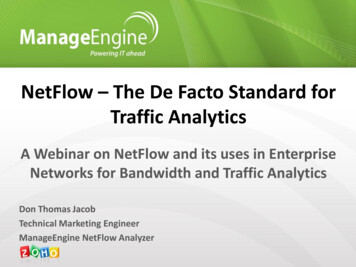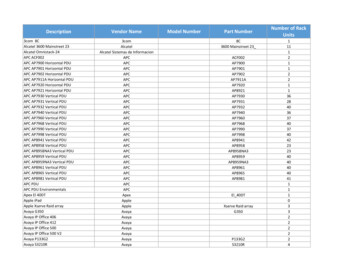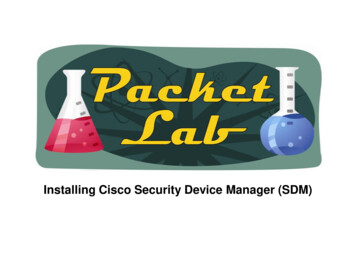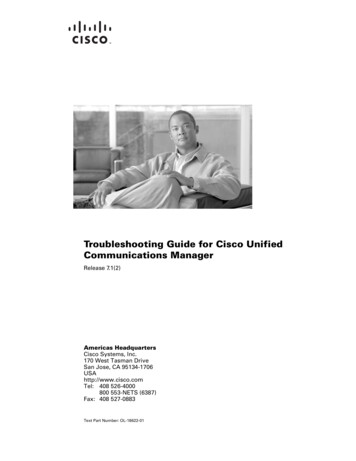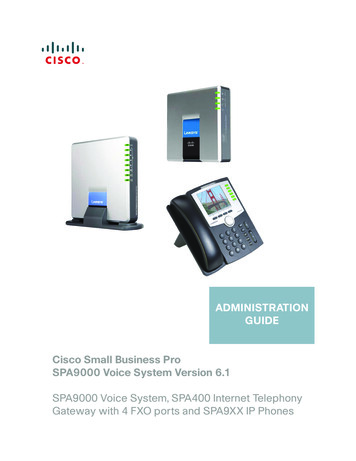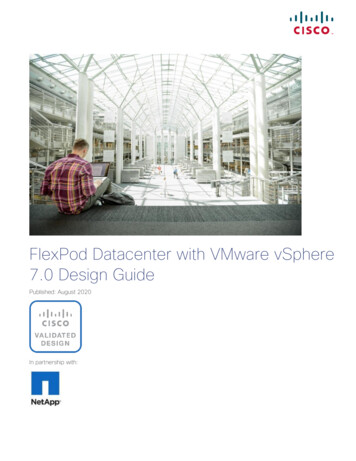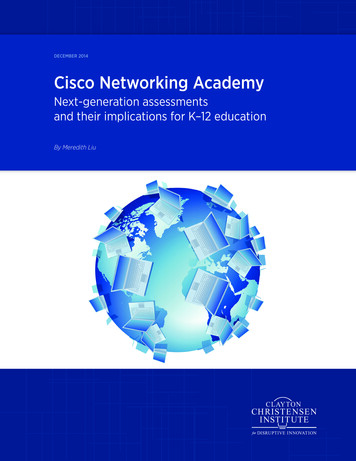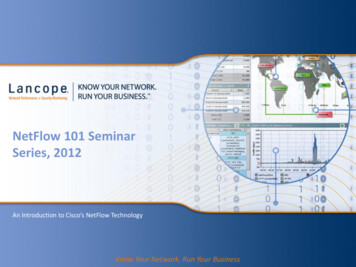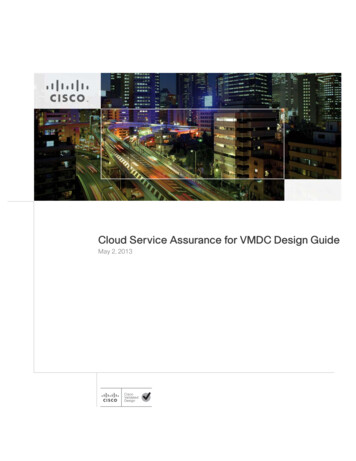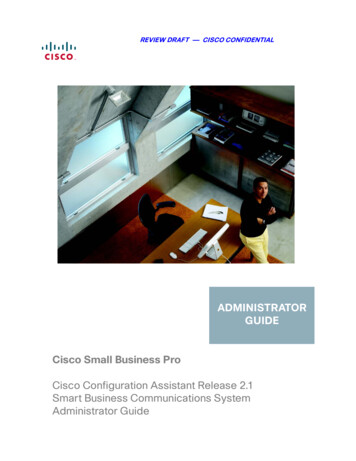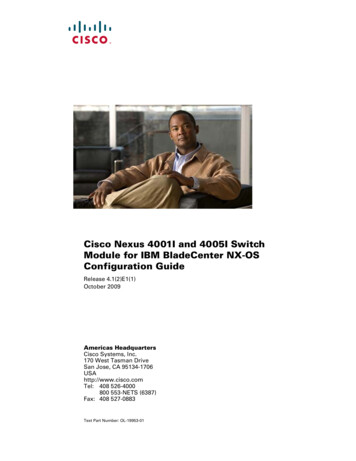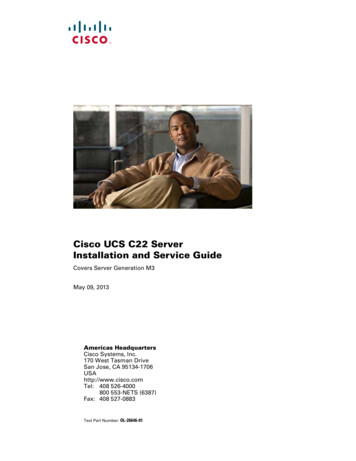
Transcription
Cisco Networking Academy: Virginia ProfileCisco Networking Academy is playing a critical role in the U.S. economic recovery by preparing students for the sustainablejobs that government, education and industry all agree will fuel America’s ability to innovate and compete, not just today butin the future. As the focus turns to infrastructure, Networking Academy provides students with critical IT and networking skillsto design, build, and maintain the infrastructure highway that both the public and private sector now depend on forsustainability.The new Obama administration clearly recognizes the importance that technology plays in preparing students to compete in a21st century global economy. In a speech on January 8, 2009, at Virginia's George Mason University, President Obamahighlighted the current science and technology skills gap in the United States and the urgent need to address it:“To give our children the chance to live out their dreams in a world that’s never been more competitive, we willequip tens of thousands of schools, community colleges, and public universities with 21st century classrooms, labs,and libraries. We’ll provide new computers, new technology, and new training for teachers, so that students inChicago and Boston can compete with kids in Beijing for the high-tech, high-wage jobs of the future.”Cisco Networking Academy is a proven model for delivering 21st century learning because it delivers: rigorous and interactive curricula licensed at no cost to nonprofit educational institutions an e-learning platform that supports different learning styles web-based content available to students 24/7 online assessments student performance tracking hands-on labs instructor training and supportNetworking Academy is a unique public-private partnership between educational institutions, national, state and localgovernment, and community-based organizations, currently educating more than 128,000 students in over 2,200 U.S.educational institutions.As an education solution, Networking Academy encourages seamless educational pathways between secondary and postsecondary institutions by using curricula aligned to national and state education standards for math, language arts, andtechnology and industry certifications. These courses also help students prepare to pursue degrees related to science,technology, engineering, and math (STEM). Networking Academy courses provide instructors with tools to help students makethe connection between their educational experience and their careers. In the United States, academies are located in highschools, technical schools, colleges, universities, and community-based organizations.Cisco Networking Academy provides: IT and networking skills mapped to high-skill, high-demand, high-wage 21st century jobs across virtually every industry sustainable partnerships at all levels of education, including community colleges at the forefront of workforce developmentand retrainingAll contents Copyright 1992–2009 Cisco Systems, Inc. All rights reserved. This document is Cisco Public Information.Page 1
strong alignment with high school career and technical education programs that build technical skills and create pathwaysfor high school graduates going either directly into the workforce or on to post-secondary education the skilled pipeline of talent required to design, build and maintain the infrastructure needed for economic recoveryIncluded in each state profile are Networking Academy statistics, IT workforce projections, and student/graduate stories. Thesestate-by-state profiles will provide you with important information about the value Cisco brings to government, education andbusiness through delivery of IT/networking skills and knowledge. Cisco Networking Academy educates the architects oftoday’s networked economy.Profiles are updated annually with core content, and we will continue to add student/graduate profiles. For your convenience,the library of profiles for each state, plus the District of Columbia and the United States as a whole, are accessible athttp://www.cisco.com/go/netacadresourcecenter.We welcome your suggestions for future profiles. Please send any questions and feedback to our U.S. Marketing Team viaNancy Bischoff at nbischof@cisco.com.Learn MoreTable 1 lists data about academies in Virginia. Table 2 lists information about Networking Academy curricula in Virginia, andTable 3 shows information by student education level.For additional information about Cisco Networking Academy, visit http://www.cisco.com/go/netacadTable 1.Cisco Networking Academy in Virginia3493Networking Academy students12% femaleFemale Networking Academy students17,293Distinct cumulative academy students (having successfully completed a course)Academies70Academy instructors127 9,679,509Total estimated cumulative contribution value to Virginia academies*Off-shore DoDDS and DoDEA academies, while linked systemically to Virginia via the academy locator tool, are not included in the commonwealthdata. For information on the DoDDS and DoDEA academies, please refer to the Federal profile.Source: AME/MRE Academy Briefing Book Details 10 31 08 v2 ALL US Acads NO Counties v5.xlsCumulative students are distinct; therefore, each student is only counted once.*This estimate includes donations and discounts made to educational institutions implementing Cisco Networking Academy within Virginia.*Source: AME/MRE report #3616student and instructor enrollment by year 2008.11.24 JBZ v9.xls Date: November 24, 2008Table 2.Networking Academy Curricula in VirginiaCurriculumAllITECCNA 1, 2CCNA 3, 4AdvancedTechnologies andOther*Number of academies by curriculum7039%87%57%13%The above curricula represent the core Networking Academy curricula.*Includes CCNP, Security, Wireless, Java, UNIX and Panduit Network Infrastructure Essentials (PNIE)Academies often teach multiple curricula and may be counted more than once in this table.Source: AME/MRE rpt #3651Active Academies by Curr Course State 2008.12.08 JBZ v4.xlsAll contents Copyright 1992–2009 Cisco Systems, Inc. All rights reserved. This document is Cisco Public Information.Page 2
Table 3.Virginia Academies and Students by Education LevelEducation LevelVirginia Students*Virginia Academies*Total NumberSecondary SchoolsCommunity %Sources: AME/MRE FULL Package 10 31 08 Quarterly Metrics Date: Nov 13, 2008 and AME/MRE rpt Template Basic curr and course and edlevel details US Fed Acads 10.31.08 v4.xls*For academies that self identify as more than one education level, the academies and students in this table are distributed proportionately acrossthe education levels. Figures are rounded.Academies represented in “Other” category include the following: community-based organizations, middle schools, the military, nontraditionaleducational settings, and post-graduate institutions.Mind Wide Open is a trademark of Cisco Networking Academy.All contents Copyright 1992–2009 Cisco Systems, Inc. All rights reserved. This document is Cisco Public Information.Page 3
Active Cisco Networking Academies in VirginiaU.S. Congressional District DatabaseData for this report was gathered using the U.S. Congressional District Database. This tool was developed to communicatewith congressional representatives about Cisco Networking Academy implementation in their home districts. The databasemaps active academies by congressional district or by all districts within a state, providing academy name, city, state, andcongressional district. The listing by state is updated annually.Table 4 lists information about academies in Virginia congressional districts.Table 4.Networking Academies in Virginia Congressional DistrictsNumber of VirginiaCongressional DistrictsNumber of VirginiaCongressional Districts withNetworking AcademiesNumber of VirginiaCongressional Districts withoutNetworking Academies% VirginiaCongressional DistrictPenetration11110100%Academies listed here have taught a class with at least three students, or adopted a new curriculum, within the last twelve monthsSource: MRE/Academy Connection, U.S. Congressional District Database Date: October 31, 2008Active Virginia Cisco Networking Academies by Congressional District* Indicates Cisco Networking Academy Training CenterAcademies listed here have taught a class with at least three students, or adopted a new curriculum, within the last twelve monthsSource: MRE/Academy Connection, U.S. Congressional District Database Date: October 31, 2008Congressional District 1Congressional District 3 Brooke Point High School (Stafford) Aviation Academy (Newport News) DODEA/USA - Quantico High School (Quantico) Norfolk State University (Norfolk) ECPI Newport News (ACC) (Newport News) Norfolk Technical Vocational Center (Norfolk) Fredericksburg City Schools (Fredericksburg) Phoebus High School (Hampton) *Germanna Community College (Fredericksburg) TCC WFD (Norfolk) North Stafford High School (Stafford)Congressional District 4 Spotsylvania High Schools (Spotsylvania) *Thomas Nelson Community College (Hampton)*Chesterfield County Public Schools - Regional(Chesterfield)Congressional District 2 Chesterfield Technical Center (Chesterfield) *ECPI Virginia Beach (ACC) (Virginia Beach) Matoaca High School (Chesterfield) Langley SOJT (Langley AFB) Paul D. Camp Community College (Franklin) Special Sessions (Virginia Beach) TCC, Chesapeake (Chesapeake) *Tidewater Community College VB (VirginiaCongressional District 5Beach) Bedford Science & Technology Center (Bedford)VA Beach Schools (Virginia Beach) Campbell County Tech Center (Rustburg) *Danville Community College (Danville) All contents Copyright 1992–2009 Cisco Systems, Inc. All rights reserved. This document is Cisco Public Information.Page 4
Virginia High School (Bristol)Congressional District 6 Washington County Technical School (Abingdon) *Central Virginia Community College (Lynchburg) Wise County Vocational Center (Wise) Heritage High School (Lynchburg) Wytheville Community College (Wytheville) Massanutten Technical Center (Harrisonburg)Congressional District 10 Roanoke Technical Education Center (Roanoke) Chantilly Academy (Chantilly) Triplett Business and Technical Institute (Mount ECPI Manassas (ACC) (Manassas)Jackson) *Lord Fairfax Community College (Middletown)*Virginia Western Community College (Roanoke) Monroe Technology Center (Leesburg)Congressional District 7 NVCC – Manassas Campus (Manassas) Culpeper (Culpeper) Osbourn High School (Manassas) Cosby High School (Midlothian) Sherando High School (Stephens City) Easternview High School (Culpeper) Warren County High School (Front Royal) James River High School (Midlothian)Congressional District 11 John Tyler Community College (Midlothian) Geo. Washington High School (Danville) Battlefield High School - VA (Haymarket)Congressional District 8 Forest Park High School (Woodbridge) Edison (Alexandria) *George Mason University - Regional (Fairfax) Marshall Academy (Falls Church) NVCC - Annandale Campus (Annandale) NVCC – Alexandria Campus (Alexandria) NVCC - Woodbridge Campus (Woodbridge) TC Williams High School (Alexandria)Congressional District 9 Buchanan County Technical and Career Center(Grundy) Dabney S. Lancaster Community College (CliftonForge) Dickenson County Career Center (Clinchco) Honaker High School (Honaker) Lebanon High School (Lebanon) Lee County Career and Technical School (Ben Hur) Mountain Empire Community College (Big StoneGap) Neff Center For Science & Technology (Abingdon) Scott County (Gate City) *Southwest Virginia Community College - Regional(Richlands)All contents Copyright 1992–2009 Cisco Systems, Inc. All rights reserved. This document is Cisco Public Information.Page 5
Mind Wide Open is a trademark of Cisco Networking Academy.All contents Copyright 1992–2009 Cisco Systems, Inc. All rights reserved. This document is Cisco Public Information.Page 6
Cisco Networking Academy: Workforce Development in VirginiaCisco Networking Academy is ready to help U.S. workers learn critical IT and networking skills throughacademies located in high schools, community colleges, four-year colleges, and nontraditional settings. Developingin-demand technical skills in a timely, focused program enables students to quickly find and retain sustainable,high-paying jobs. Academy courses map to industry certifications and prepare students for technical jobs in a new,improved technical infrastructure across the nation. Even students who complete introductory courses will beprepared to work for companies that depend on a technical infrastructure for business sustainability.“Obama’s pro-tech agenda could increase the number of technology jobs in the United States by 10 percent, adding about300,000 high-paying IT positions.” –Katherine McGuire, VP of government relations, Business Software Alliance 1“Even with this economic downturn, the jobs outlook in IT for 2009 is better than that of many other industries, since IT is nolonger at the peripheral of industries but at the core of their competitive edge, and IT will play a critical role in theinfrastructure build out.” –David Foote, CEO of Foote Partners LLC, which analyzes IT wages and hiring data 1As the U.S. remains focused on economic recovery throughout 2009, there is a growing emphasis on upgrading the educationalinfrastructure to deliver the required knowledge and skills to build the needed technical workforce to support and maintaintechnology infrastructure assets and requirements. Just as the interstate highway investment created millions of constructionjobs, which were then followed by maintenance and automotive jobs in the long term, so technology investments will initiallycreate jobs necessary to design and deploy technology infrastructure, and these jobs will be followed by an array of newbusiness opportunities.“Investments in America’s digital infrastructure will spur significant job creation in the immediate term. An investment of 40billion in IT network infrastructure in 2009 will create more than 949,000 U.S. jobs, more than half of which will be in smallbusinesses.” –Technology CEO Council press release 2Cisco Networking Academy addresses the need for 21st century teaching and learning models that prepare students to moveinto the pipeline of talent needed to fill these high-skill, high-wage, high-demand careers."We will enable students of all ages to learn in 21st century classrooms, labs, and libraries, to help our students compete withany worker in the world." –American Recovery and Reinvestment Plan press release 3In a recent report, the Information Technology and Innovation Foundation “finds that investments in America’s digitalinfrastructure will spur significant job creation in the short run. Specifically, ITIF estimates that an additional investment of 30 billion in America’s IT network infrastructure in 2009 will create approximately 949,000 U.S. jobs.” 41Computerworld, 1/5/09, Stimulus could create thousands of IT o?command viewArticleBasic&articleId 3317832Technology CEO Council, Wash. D.C. tion com content&task blogsection&id 8&Itemid 1593American Recovery and Reinvestment Plan press release, 1/16/09, -15-09.pdf4ITIF, 1/7/09, The Digital Road to Recovery: A Stimulus Plan to Create Jobs, Boost Productivity and Revitalize America,http://www.itif.org/index.php?id 212All contents Copyright 1992–2009 Cisco Systems, Inc. All rights reserved. This document is Cisco Public Information.Page 7
IT Occupational DataTable 5 lists information about IT-related occupations in the United States, and Table 6 lists this information for Virginia.Table 5.Selected IT-Related Occupations in the United omputer Support mputer Systems k and ComputerSystems etwork Systems and DataCommunications uter and InformationSystems mentEmployment ChangeOccupationOccupationalEmploymentas of May 2007*U.S. Department of Labor, Bureau of Labor Statistics, http://www.projectionscentral.com, based on data availability as of October 31, 2008*U.S. Department of Labor, Bureau of Labor Statistics, May 2007 State Occupational Employment and Wage Estimates able 6.Selected IT-Related Occupations in sComputer Support Specialists19,19123,091390020.39839960Computer Systems Analysts33,11546,83813,72341.4225031,690Network and ComputerSystems k Systems and DataCommunications Analysts15,31025,205989564.6130212,780Computer and InformationSystems yment ChangeOccupationOccupationalEmployment asof May 2007 Virginia Employment Commission, http://velma.virtuallmi.com/occupation onet.asp?session occdetail lms&geo 5101000000, based on dataavailability as of October 31, 2008 U.S. Department of Labor, Bureau of Labor Statistics, May 2007 State Occupational Employment and Wage Estimates (by mMind Wide Open is a trademark of Cisco Networking Academy.All contents Copyright 1992–2009 Cisco Systems, Inc. All rights reserved. This document is Cisco Public Information.Page 8
Virginia Student and Graduate ProfileCharles Stembridge’s early interest in technology was a clear indication of things to come. “I have been fascinated withcomputers and networks since I was a toddler,” says Charles. “It started with electrical circuits and eventually progressed tocomputers and telephony by the time I was in elementary school,” he recalls. Charles’ attraction to computer networkingemerged when in second grade he noticed that the Apple II computers could all share the same network. Five years later, inseventh grade, Charles built his own PC using a “bare-bones” kit his father ordered for him that included the case,motherboard, and processor. Charles ordered the memory, hard drive, floppy, and CD-ROM and then built the computer fromthe ground up.Charles enrolled in Cisco Networking Academy as a sophomore at James River High School in Midlothian, Virginia and,within the next two years, not only earned his Cisco Certified Network Associate (CCNA ) certification but also began hisown PC repair and network installation service. By the time he graduated from college, Charles had leveraged his three yearsof experience as an information technology (IT) business owner to land a corporate IT job where he soon earned a promotion.Charles first heard of the Networking Academy from Linda Lester, his freshman computer instructor at James River HighSchool. Charles notes, “Cisco seemed to be the major network vendor to know, so when there was an opportunity for me tolearn it, I jumped at it.” Linda, who taught some of the Networking Academy classes, allowed Charles to enroll as a sophomoreeven though the school restricted the curriculum to juniors and seniors.“The Cisco courses gave me a huge leap ahead of nearly every other student enrolled in the InformationSystems program,” Charles explains. “I had already learned the basics behind the technologies, whichallowed me to work on the content of various projects through my college career instead of having tofirst catch up to the principles.”He continued his technical education at Virginia Commonwealth University (VCU). “The Cisco courses gave me a huge leapahead of nearly every other student enrolled in the Information Systems program,” Charles explains. “I had already learned thebasics behind the technologies, which allowed me to work on thecontent of various projects through my college career instead of havingto first catch up to the principles. The courses gave me the backgroundnecessary to open doors to other information systems disciplines suchas programming, hardware prototyping, and database design.”Although Charles had been running his small network installation andPC repair business for three years, in his junior year of college hedecided he needed more corporate experience. Charles began workingas a seasonal information systems technician at Kings Dominion, atheme park in nearby Doswell, and was promoted to InformationSystems engineer where he is now responsible for the networkinfrastructure and designing and modifying corporate and local levelapplications used throughout the organization. Charles also maintainsback office and point-of-sale systems and administers two of theprimary SQL servers.All contents Copyright 1992–2009 Cisco Systems, Inc. All rights reserved. This document is Cisco Public Information.Page 9
Charles commented on his Networking Academy education: “Many of the things I learned taking the Cisco courses I still applytoday, even in an environment that is not fully network based. Many of the diagnostic skills you learn in Cisco carry over withyou no matter what field of IS you are working in.”“Many of the things I learned taking the Cisco courses I still apply today, even in an environment that isnot fully network based. Many of the diagnostic skills you learn in Cisco carry over with you no matterwhat field of IS you are working in.”Charles graduated from VCU in October 2008 with a bachelor’s degree of science in information systems. He plans to earn amaster’s degree in computer information systems security in the next two years.When asked what he enjoyed most about the Networking Academy, Charles replied “I felt challenged throughout the program,more so than most of my classes at the time. I had an interest in the material and principles, and I knew it would benefit methroughout my career. Finally, the teacher, Ms. Lester is one of the best I have ever had.”Charles remains in touch with his former instructor, serving on the advisory committee at Chesterfield Technical Center whereLinda now teaches. Linda adds, “Charles has been an active member of our advisory council for the past year. He attends andparticipates in all activities such as speaking to the classes and working with the second year students on their gaming eventand capstone project. He is a great guy and continues to work with our students.”When Charles is not working on computers, he builds houses and enjoys fishing, going to the beach, and gaming. Lookingback he says, “The Networking Academy has given me a distinct advantage throughout my career. It provides both thetheoretical and practical knowledge necessary to work in the real world. It opened doors for me and gave me the confidence towalk through them.”For more information on the Networking Academy at James River High School: http://jrhs.ccpsnet.net/ orhttp://jrhs.ccpsnet.net/cte infosystech.phpMind Wide Open is a trademark of Cisco Networking Academy.All contents Copyright 1992–2009 Cisco Systems, Inc. All rights reserved. This document is Cisco Public Information. Page 10
The new Obama administration clearly recognizes the importance that technology plays in preparing students to compete in a . NVCC - Alexandria Campus (Alexandria) TC Williams High School (Alexandria) . 300,000 high-paying IT positions." -Katherine McGuire, VP of government relations, Business Software Alliance 1
